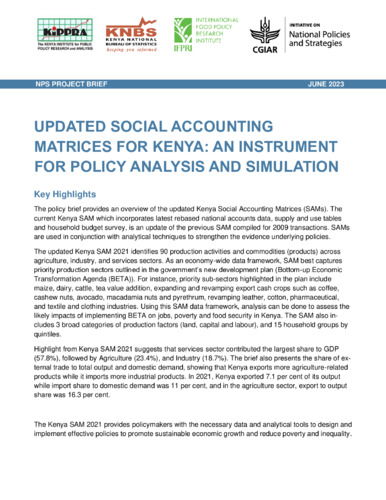Updated social accounting matrices for Kenya: An instrument for policy analysis and simulation
Abstract
The policy brief provides an overview of the updated Kenya Social Accounting Matrices (SAMs). The current Kenya SAM which incorporates latest rebased national accounts data, supply and use tables and household budget survey, is an update of the previous SAM compiled for 2009 transactions. SAMs are used in conjunction with analytical techniques to strengthen the evidence underlying policies. The updated Kenya SAM 2021 identifies 90 production activities and commodities (products) across agriculture, industry, and services sectors. As an economy-wide data framework, SAM best captures priority production sectors outlined in the government’s new development plan (Bottom-up Economic Transformation Agenda (BETA)). For instance, priority sub-sectors highlighted in the plan include maize, dairy, cattle, tea value addition, expanding and revamping export cash crops such as coffee, cashew nuts, avocado, macadamia nuts and pyrethrum, revamping leather, cotton, pharmaceutical, and textile and clothing industries. Using this SAM data framework, analysis can be done to assess the likely impacts of implementing BETA on jobs, poverty and food security in Kenya. The SAM also in cludes 3 broad categories of production factors (land, capital and labour), and 15 household groups by quintiles. Highlight from Kenya SAM 2021 suggests that services sector contributed the largest share to GDP (57.8%), followed by Agriculture (23.4%), and Industry (18.7%). The brief also presents the share of ex ternal trade to total output and domestic demand, showing that Kenya exports more agriculture-related products while it imports more industrial products. In 2021, Kenya exported 7.1 per cent of its output while import share to domestic demand was 11 per cent, and in the agriculture sector, export to output share was 16.3 per cent. The Kenya SAM 2021 provides policymakers with the necessary data and analytical tools to design and implement effective policies to promote sustainable economic growth and reduce poverty and inequality.

